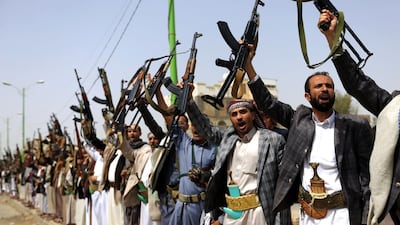The leader of an Iran-backed militia in Iraq has declared support for Houthi rebels in Yemen, strengthening Tehran's influence in the region.
The declaration came as an offensive on the rebel-held port city of Hodeidah has been put on hold by the Saudi-led Arab Coalition, which includes the UAE, to give the United Nations a chance to broker a peaceful resolution.
Abu Walaa Al Walai, leader of the Katab Sayyed Al Shuhada, said his forces were ready to fight beside the Houthis and were awaiting orders from the leader of the Iran-backed rebels, Abdul Malik Al Houthi.
The brigades are a part of the Iraqi paramilitary forces known as the Popular Mobilisation Units that include the Badr Organisation and Katab Hezbollah as well as several others that were largely armed, funded and trained by Iran's Islamic Revolution Guard Corps to fight against ISIS in Iraq.
“I am a soldier standing at the signal of Abdul Malik Al Houthi. I say to you, sir, that I am at your disposal,” Mr Al Walai said in a video posted on Twitter.
The powerful Iranian proxy group was formed in 2013 to fight in Syria. Its offer to fight alongside the Houthis came days after the Arab Coalition supporting Yemen's legitimate government reported that eight members of Lebanon's Hezbollah, another Iran-backed force, were killed in the country's north.
Tehran says it supports the Houthis politically but denies arming the rebels, despite investigations by the United States and United Nations showing that weapons and missiles used by the rebels originated in Iran.
_______________
Read more:
Yemen forces make significant advances in Saada province
Newly-deployed UAE-trained Yemeni forces key to Hodeidah victory
Houthis cut off internet to 80 per cent of Yemen
_______________
The port of Hodeidah is the entry point for most of Yemen's aid and commercial goods, but the coalition says it is also being used by the Houthis to smuggle in weapons provided by Iran.
A senior IRGC officer boasted last month that Iran's regional policies and the use of proxy forces from Lebanon to Yemen had allowed it to push the battlefield away from the country’s borders.
“We have pushed back in the enemy’s field to control the vast geographic areas and move the battlefields away” from Iran, Brig Gen Hossein Salami said.
Although Iran had once lacked the power to project militarily and despite a “massive war with global ranks” waged against it, the Iranian government was able to build up its power, Brig Gen Salami said in remarks reported by the Iranian Students' News Agency.
“From Lebanon and Syria to Iraq and Yemen, with all that poverty you can still see the rise of a power called the Islamic Resistance,” he said.
Meanwhile, Yemeni government forces made significant advances against the rebels in the eastern province of Saada, taking full control of key mountains in the Kataf directorate, according to a military source quoted by the state-run Saudi Press Agency.
The coalition struck more than eight Houthi targets, including a troop convoy on its way to Saada.
The UN's Special Envoy to Yemen, Martin Griffiths, has been attempting to restart peace talks between the rebels and government and avert a battle for Hodeidah.
The Yemeni government has called for the rebels to make an "unconditional withdrawal" from the city. The Houthis have refused to hand over the city but recently offered to submit the port to UN control as part of a ceasefire in the city.
Mr Griffiths is expected to hold another meeting with President Abdrabu Mansur Hadi on Monday.
The war in Yemen was triggered when the Houthis seized the capital, Sanaa, in September 2014 and later advanced south, taking large areas of the country.
The coalition intervened in the war in March 2015 at the request of Mr Hadi to help re-establish government control across the south.
Saudi Arabia and the UAE are involved in extensive aid efforts for Yemeni civilians, with an Emirati ship taking food supplies to the eastern province of Hadramawt docking at Mukalla port on Sunday.


